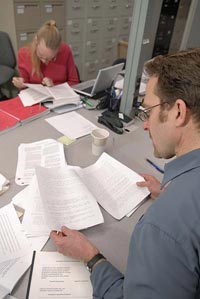Practical experience for law students garners national attention
Lawyer Melanie Cairns faces a heavy caseload every day, working with clients in an array of legal jams — from divorce and child custody cases to domestic violence cases and landlord-tenant disputes.

Steve Meili, director of the UW–Madison Consumer Law Clinic, works with a Law School student in March 2007, in the Law Building to prepare a Wisconsin State Supreme Court brief.
Photo: Jeff Miller
But it was her real-world work with a much smaller caseload as a student at the UW Law School that prepared her to face her daily challenge at Prairie State Legal Services in Rock Island, Ill.
“Working with the Family Law Project and the Restorative Justice Project gave me the chance to have a small caseload, research every aspect of a case, get to know clients’ cases and the law, and write divorce petitions three or four times, just to get them right,” she says. “Now, I meet a client and three days later, I’m in court.”
Her current, compressed time frame puts a premium on drafting accurate paperwork and interviewing clients, skills she honed in her clinical programs, she says.
“The clinical experience gave me a base for the work I’m doing,” says Cairns, a 2007 graduate. “The clinical programs are what sold me on the University of Wisconsin.”
The Law School’s clinical programs, under the watchful eye of supervising attorneys, are designed to provide practical legal experience and skills.
The school is known for the quality and scope of its more than 10 clinical programs, including some of the nation’s longest-established practical programs.
National Jurist magazine this fall ranked the UW–Madison Law School second nationally, behind Yale Law School, as “Best in Practical Training.” Law schools were ranked based on the number of available clinical positions per full-time student. Wisconsin tied with the Drake University Law School.
“We’re delighted to be recognized for our commitment to this significant aspect of legal education,” notes Law School Dean Kenneth B. Davis. “We were a leader in clinical education right from the start, and we understand the importance of combining substantive law classes with attorney-supervised clinical experiences to help students grow as professionals.”
Clinical education has become increasingly important during the past few years as studies on legal education call for more of these learning opportunities and student demand for relevant, hands-on training increases.
A recent report by the Carnegie Foundation for the Advancement of Teaching, which critiqued legal education in the U.S. and Canada, emphasized the importance of clinical experiences in educating future lawyers.
Ambrea Bigley, a lawyer with the Minneapolis law firm of Dorsey and Whitney, graduated from the Law School in June, having completed one year in the Family Law Project as a student and a second year as a project assistant.
“The legal education I received in the classroom taught me legal theory and how to interpret the law, whereas the clinical program brought the law to life and taught me how to apply what I learned in the classroom to the practice of law,” Bigley says.
The experience also provides an important confidence boost for students making the transition to the practice of law.
“The clinical experience equips students with a level of confidence in their legal skills and abilities,” she says. “There is an expectation that when you walk out of law school you will be fully prepared to enter the legal profession. I don’t know how you could ever be fully prepared, but without the clinical experience, the transition from student to attorney would have been much more daunting.”
Winn Collins also took advantage of clinical opportunities, working with the Wisconsin Innocence Project and the Prosecution Project. Today, he is district attorney in Wisconsin’s Green Lake County.
“When I look back, what prepared me most to work in the field on a daily basis were the clinical programs I was involved with,” says Collins, a 2003 graduate. “The clinicals teach you how the system works.”
Collins worked as an intern in the Outagamie County district attorney’s office, and after graduating worked there for more than three years.
“As an intern, I worked on four jury trials and, as much as anything in the classroom, they prepared me for life as a prosecutor,” he says.
Legal clinics, like medical internships for future doctors, offer students who are preparing for the legal profession an opportunity to develop the necessary skills in a closely supervised setting. Clinics prepare students to work with clients, be problem solvers and deal with complex ethical issues.
“We think they learn better and learn in a concrete way,” says Meredith Ross, director of the Law School’s Frank J. Remington Center. “Learning about how systems operate, whether in family law, consumer law or criminal law is every bit as important as learning about law on the books.”
About 145 students take part in clinicals in the Remington Center each year, and more take part in programs offered by the Center for Patient Partnerships and the school’s Judicial Internship Program, which places students in externships in judges’ offices.
The Law School’s clinical projects cover a broad array of legal practice, including family law, appellate practice, landlord-tenant, criminal law, consumer law litigation, and patient advocacy.
The Remington Center, which is home to most of the clinical projects, is one of the longest-established clinical programs in the nation.
Subscribe to Wisconsin Ideas
Want more stories of the Wisconsin Idea in action? Sign-up for our monthly e-newsletter highlighting how Badgers are taking their education and research beyond the boundaries of the classroom to improve lives.




